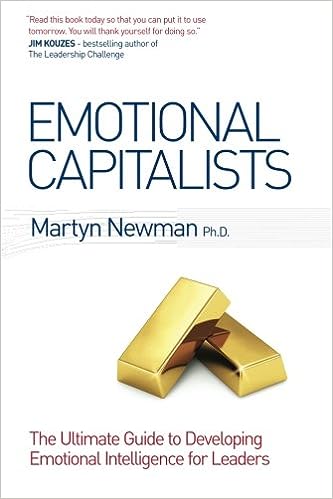In this influential book (Emotional Capitalist), Newman, a respected academic psychologist and leadership consultant, argues that emotional intelligence is the key to success in the modern economy. He claims that emotional intelligence, or the ability to understand and manage one’s own and others’ emotions, is a vital skill that can help leaders create positive relationships, inspire teams, and drive innovation. He also provides a framework for developing and measuring emotional intelligence, as well as practical tips and exercises to improve it.
Newman is not alone in this conviction. Recent World Economic Forum meetings have suggested that emotional intelligence is one of the top two requisites for today’s successful leaders.
The book is divided into three parts. The first part introduces the concept of emotional intelligence and its importance for leaders in the 21st century. Newman explains that emotional intelligence is not just a soft skill, but a hard asset that can generate value and competitive advantage. He also outlines the ten emotional skills that make up emotional intelligence, such as self-reliance, optimism, empathy, and social skills. He provides examples of how these skills can help leaders overcome challenges, seize opportunities, and achieve goals.
The second part of the book focuses on how to assess and develop one’s emotional intelligence. Newman presents a tool called the Emotional Capital Report (ECR), which is a psychometric test that measures one’s level of emotional intelligence across the ten skills. The ECR is based on a scientific model of emotional intelligence that Newman developed with his colleagues at RocheMartin, a consultancy firm that specialises in emotional intelligence training and coaching. The model is derived from extensive research on the psychological and neurological foundations of emotions and their impact on behaviour and performance. The model identifies four domains of emotional intelligence: self-awareness, self-management, social awareness, and relationship management. Each domain consists of several skills that can be learned and improved.
Self-awareness is the ability to recognise and understand one’s own emotions, strengths, weaknesses, values, and motives. It also involves being aware of how one’s emotions affect one’s thoughts, decisions, and actions. Self-awareness helps leaders to be authentic, confident, and resilient.
Self-management is the ability to regulate and control one’s own emotions, impulses, and behaviours. It also involves being able to adapt to changing situations, cope with stress, and pursue goals. Self-management helps leaders to be disciplined, optimistic, and proactive.
Social awareness is the ability to empathise and understand the emotions, needs, and perspectives of others. It also involves being able to read social cues, appreciate diversity, and respect cultural differences. Social awareness helps leaders to be compassionate, attentive, and cooperative.
Relationship management is the ability to build and maintain positive relationships with others. It also involves being able to communicate effectively, influence others, resolve conflicts, and work in teams. Relationship management helps leaders to be trustworthy, persuasive, and collaborative.
The ECR provides a detailed report of one’s emotional strengths and areas for improvement, as well as suggestions on how to enhance each skill. Newman also offers a self-assessment questionnaire that readers can use to get a snapshot of their emotional profile.

The third part of the book explores how to apply emotional intelligence in various contexts and situations. Newman discusses how emotional intelligence can help leaders communicate effectively, build trust, motivate others, resolve conflicts, and cope with stress. He also gives advice on how to use emotional intelligence to foster a positive organisational culture, attract and retain talent, and promote innovation and change. He concludes by emphasising that emotional intelligence is not a fixed trait, but a dynamic and learnable skill that can be improved with practice and commitment.
The book is accessible, informative, and insightful. Newman writes in a clear and engaging style, using anecdotes, case studies, and research findings to illustrate his points. He also provides useful tools and exercises that readers can apply to their own situations. The book is relevant and valuable for anyone who wants to improve their leadership skills and I would recommend it to anyone who is invested in learning more about emotional intelligence and how to use it to achieve personal and professional success. Moreover, I value the ECR in my own coaching practice and recommend its valuable insights for all leaders who are seeking to develop and excel in this important leadership attribute.


